Partisan ID in the United States
Gallup has the 2021 numbers.
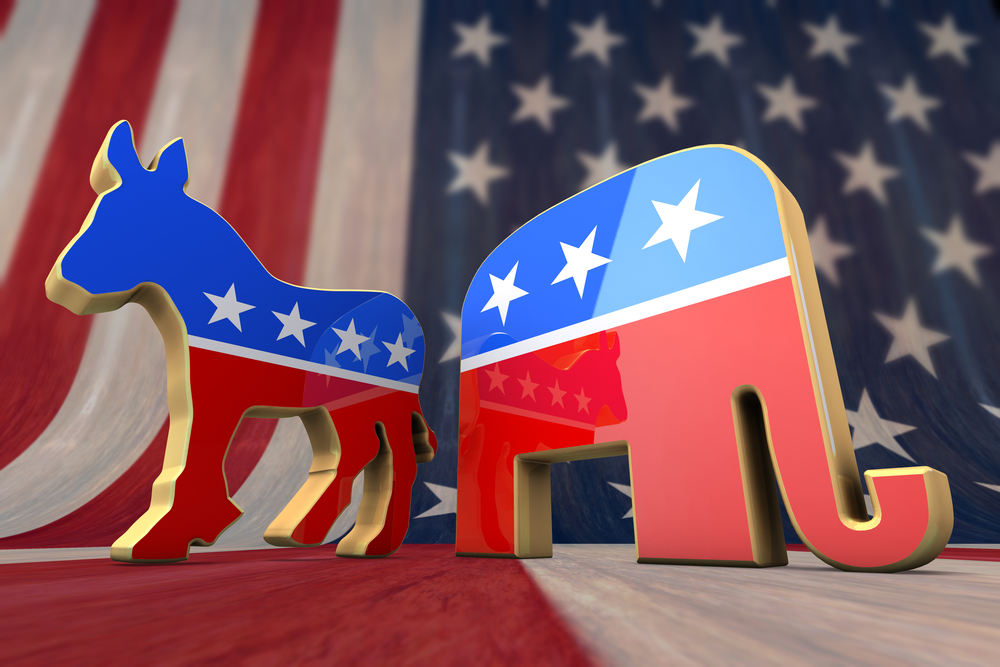
Gallup has the party ID stats for 2021 with a dramatic headline that I think over-emphasizes a not especially surprising finding: U.S. Political Party Preferences Shifted Greatly During 2021.
Let’s start with the buried lede, which is that overall the numbers are stable within long term patterns:
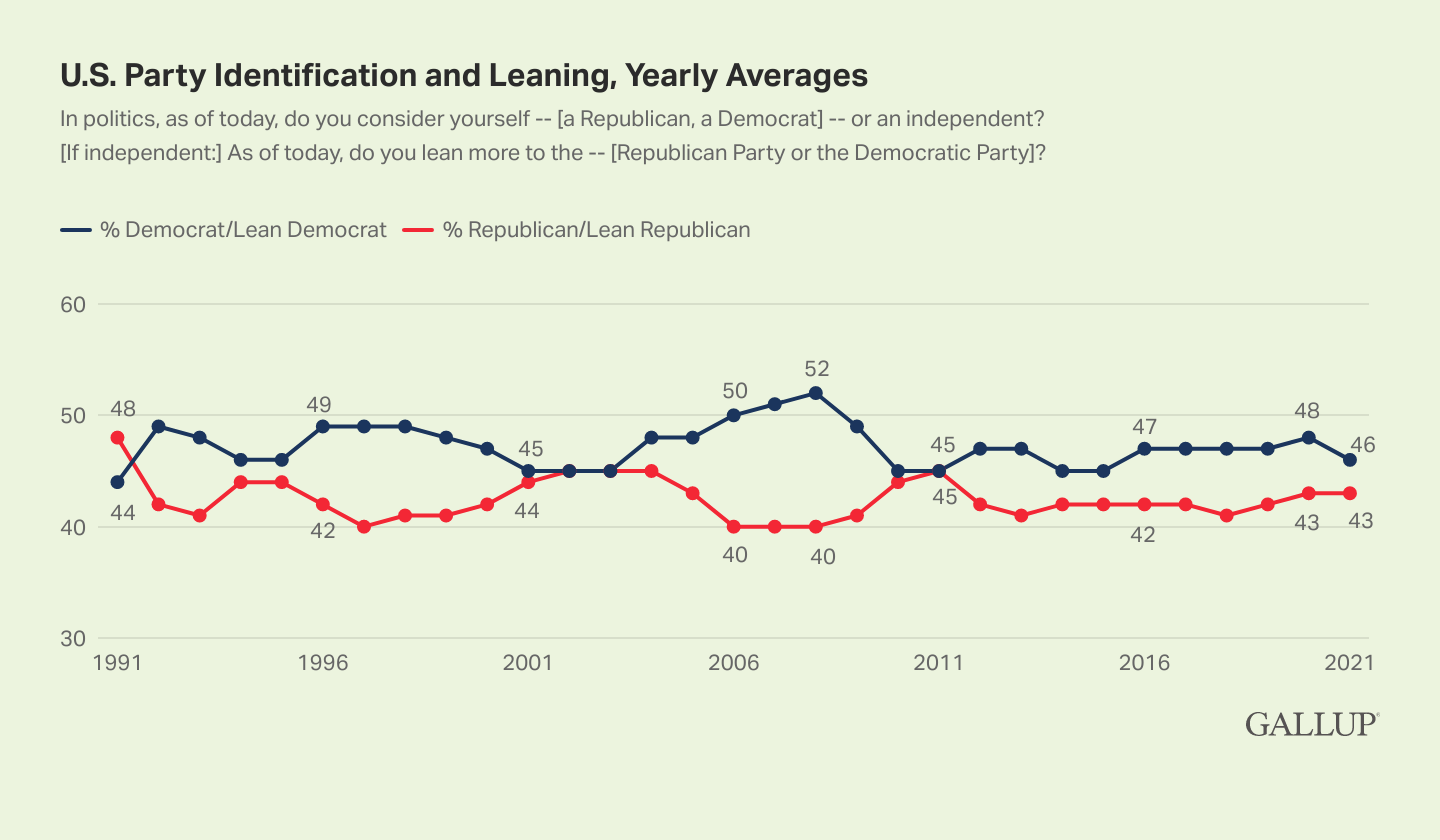
Over the last decade, the stability is actually quite striking (and even the pro-D bump in the mid-to-late-00s is hardly dramatic). Really, 2021 is essentially the same as 1991.
Still, it is true that within 2021, the Democrats took a dive. Here are the quarterly numbers:
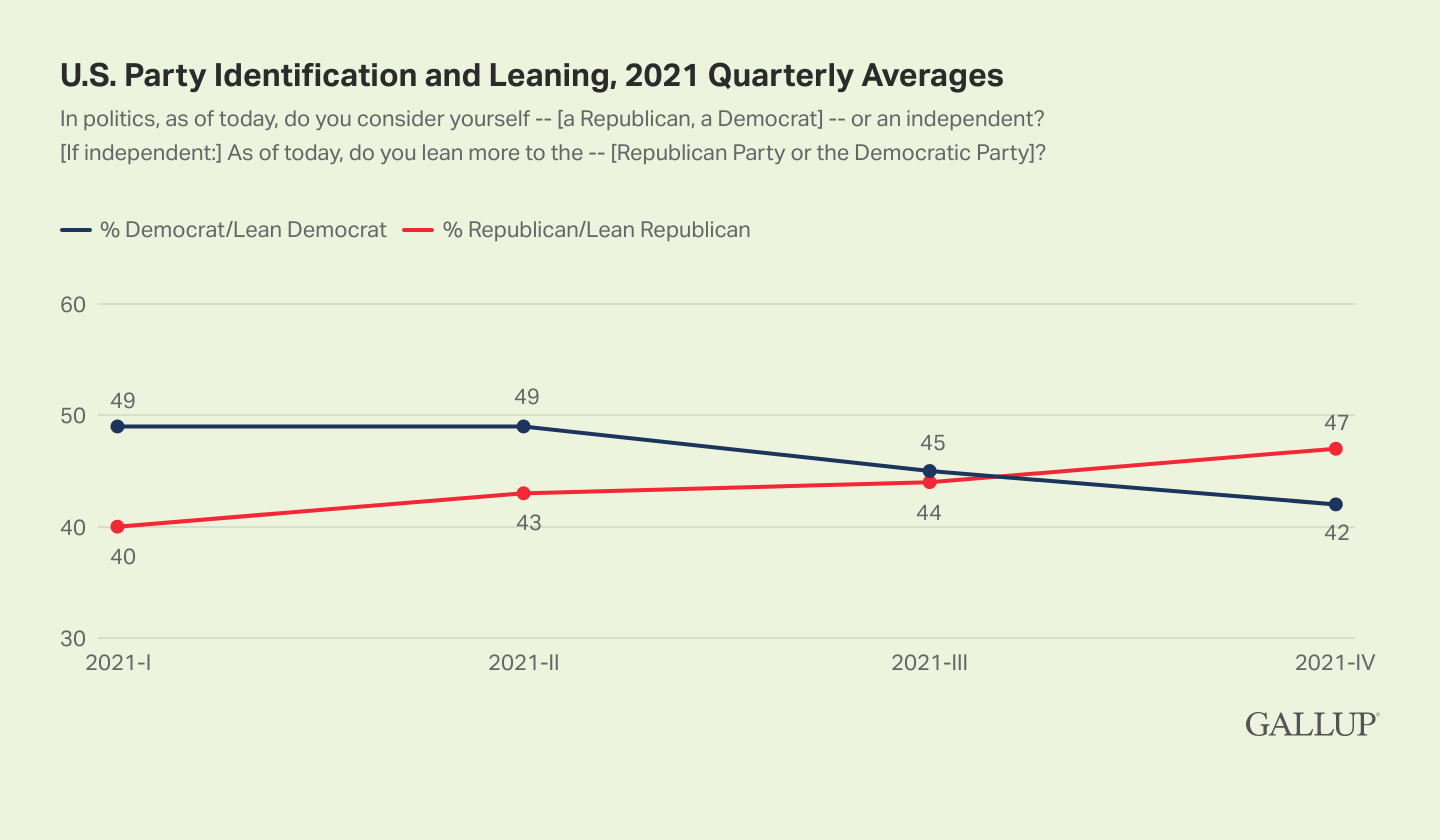
What immediately strikes me looking at these numbers is that they largely track Biden’s approval rating (as the write-up acknowledges). It also tracks with the discussion we have had here at the site about why the party in the White House does poorly in mid-terms: that party will always disappoint some segment of the population.
Here’s the 538 average as of today:
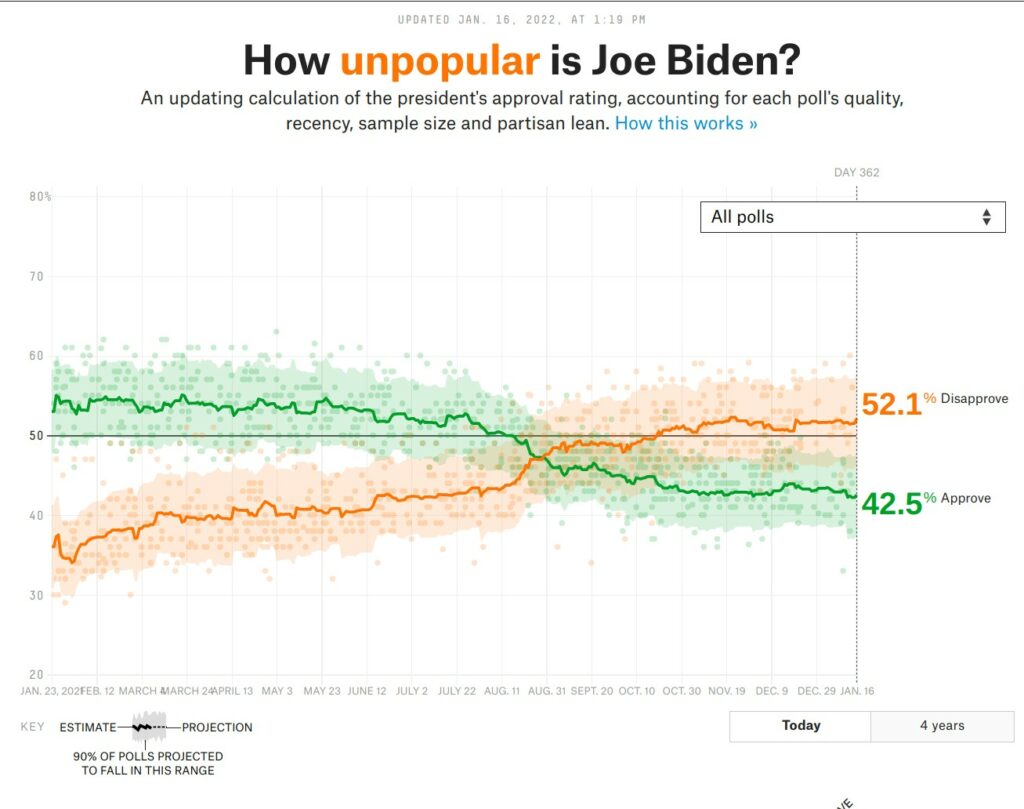
It stands to reason the party identification would track along with presidential approval. Moreover, it also stands to reason that in the first year of an administration that there would be a shift downward in both approval and, as a result, party ID. After all, when you only have two operative choices, where else are disaffected and disappointed people going to go save to the other party? People don’t want to identify with that which they disapprove.
The funny thing is that last year there was also a shift in party ID over the year, but the headline read Party ID Average for 2020 Winds Up Similar to Prior Years (which was a true headline for 2020 and for 2021–and, as noted above, basically every year since 2011, if not in many ways since 1991).
Here was last year by month instead of by quarter:
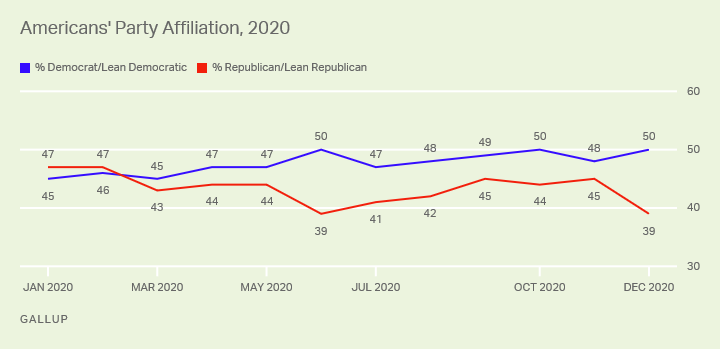
I mean, comparing January 2020 to December 2020, the Reps lost 8 points to the 9 points the Dems lost this year–making the two years rather similar. Perhaps there is a reason that looking at yearly averages makes more sense. This is yet another in a legion of examples wherein choices of headlines can radically influence how people read stories.
At any rate, here is the breakdown for R, D, and I through 2021, which also shows a fairly stable pattern for the last decade-plus:
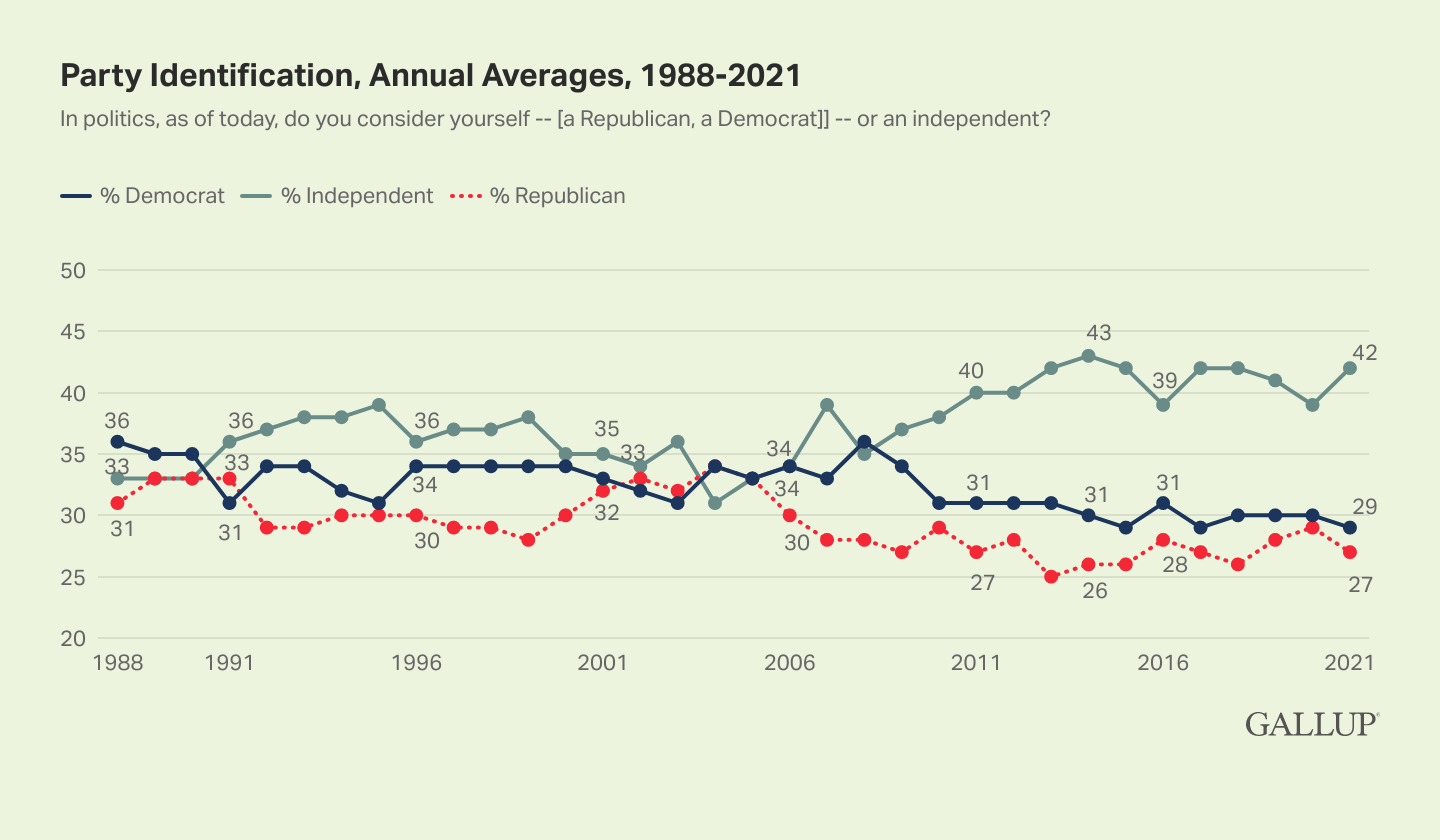
Of course, I would be remiss in not noting that while a plurality of Americans self-identify as “independents” they vote with one of the two mainline parties in mostly consistent ways election after election. While I do think that a different set of electoral rules would birth new parties in the US over time, those who look at these numbers and think that there is a new party that can be carved out from that 42% under our current system are simply incorrect (I am looking at you, Andrew Yang).

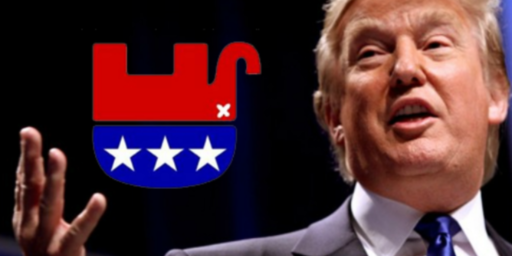
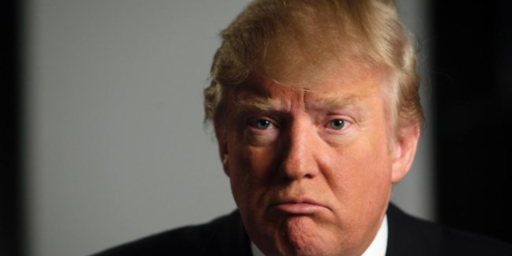
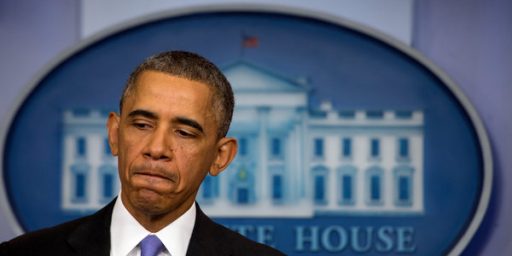
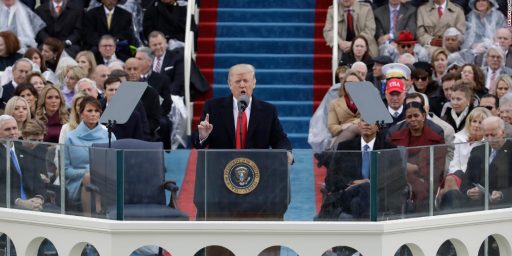
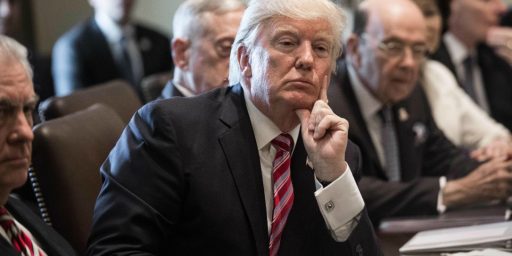
There’s another aspect to this that isn’t being appreciated anywhere from what I’ve seen.
I live in Idaho. It’s red as red can be. Whoever wins the GOP primary for any statewide office wins the election, period.
As a result, Democrats who want to have _any_ say at all in their government – or who want to try & keep the worst of the crazies out of office – have no choice but to register as Republicans, because the GOP here has a closed primary system.
My one hope for Yang’s Freedom Party (and it’s a slim one) is that he pulls enough attention to make the other parties pay attention and pull back to the center a bit.
@Mu Yixiao: But I think that is based in the false assumption that “independent” is a marker for “centrist.”
In addition to @Steven L. Taylor: @Steven L. Taylor point, I think it also greatly overestimates both Yang’s political skills and overall appeal.
@matt bernius: Indeed. As well as his understanding of electoral math.
@Steven L. Taylor:
According to a Gallup poll that came out today, 37% of Americans identify as “moderate”. That’s irrespective of political party.
That’s a big enough pool that, if Yang gets attention* he might get the Reps & Dems working to pull in those moderate votes so as not to lose them to the other side. It’s not going to bring them back to the center, but it might slow down the train a little.
As I said: It’s a hope–and a small one at that.
==============
*As in “celebrity”, not votes.
@Mu Yixiao: What does this have to do with Yang tho? Yang is not a moderate. He signature policy is pure socialism.
@matt bernius:
Umh, yeah. I can’t see anyone who wears a “MATH” lapel pin as a skilled politician destined for great things.
@Dude Kembro:
UBI is a progressive plank, but he’s a mixed bag. He’s also for ranked-choice voting, open primaries, and multimember districts. And he’s talked about some free-market policies that are closer to libertarian or old-school Republican.
@Mu Yixiao: That 37% of Americans self identify as “moderate” is mostly the result of very few people having any idea at all what words like “liberal”, “moderate”, and “conservative” mean in a political context. There seem to be a lot of self identified “conservatives” who support abortion rights, gay marriage, tighter gun laws, higher taxes on the wealthy, and so on.
@Mu Yixiao:
Sure. But what does that actually mean in practice?
Based on what is clearly a brief interaction, you are coming across as making the same argument that is perennially made based on these kinds of polls: that there is a coherent moderate middle that could be harnessed (I would argue it is the same kind of thing we see from columnists all the time).
But, of course a lot of people want to identify as “moderate” or “independent.” It sounds better to a lot of people than saying they are moderate. Of course, a ton of those independents say that they “vote the person, not the party” (which sounds very high-minded and above the partisan fray) while somehow managing to always find the right person in the same party for decades.
For that matter, if you don’t to be in the R or D camp, I (or “moderate”) is just a nice, safe residual category.
(And this doesn’t even begin to address a decades-long battle against self-identifying as “liberal” in our politics, let alone “progressive”).
I am not saying that there aren’t potential parties out there nascent in the populace; they are. But it is not the case that it is just a carving out of the middle of the current system. We have seen this repeatedly (Perot being the best example, but also No Labels and a bunch of others I can’t conjure at the moment).
It is an undying myth.
@gVOR08:
Umh, yeah. I can’t see anyone who wears a “MATH” lapel pin as a skilled politician destined for the presidency.
Oh. There’s no way in hell he’ll win (and I wouldn’t want him to). But maybe he can make enough noise to get things moving in the right direction.
@Steven L. Taylor:
The chance of new parties at the national level making any sort of dent is, as you’ve pointed out, highly unlikely. If self-identified moderates make a big enough noise, however, they become the ones for the two main parties to fight over.
I’ll also wager that most of those moderates are less likely to vote. If Yang (or anyone else) can get these people to the polls, that’s great. They’re doing to vote R or D (not Y), but they’re probably going to vote for more reasonable candidate and not the crazies–John McCain instead of Marjorie Taylor Greene, Biden instead of Yang.
@Mu Yixiao: Part of what I am saying, however, is that you are treating (as is often true such conversations about American politics) self-identified moderates as an at least semi-coherent whole. I don’t think there is evidence to support that assumption.
If you think about “moderate” as a residual catch-all, it changes the notion that they, as a group, would be making noises of the type you suggest.
To perhaps explain what I am saying: if a poll said that 33% of people are football fans, 34% are baseball fans, and 33% would prefer to be a fan of some sport that is neither football nor baseball, there is zero assurance that those 33% would all be fans of soccer (or of any specific sport as a group and very likely would want a variety of different things–all they know for sure is that neither football nor baseball is the preference).
The analogy is imperfect for a variety of reasons but captures the basics of my point.
@Mu Yixiao:
Dude, I identify as a moderate, and I just think the FEMA re-education camps should actually attempt to re-educate people.
I’m joking*, but self-identification is bunk. There’s always someone more extreme than you, which makes you seem moderate by comparison, so that category will get a lot of randos.
*: There’s no way they’re going to learn anything. Just drop them all on an island, hand them a conch shell, and let them work it out for themselves.
@Steven L. Taylor: :
Indeed, in that analogy, most of them are football and baseball fans pissed off that the game isn’t as rough as it used to be, hate the DH, or some such but still watch the games on TV and just bitch about how it used to be.
“Moderate” is always self-defined and it almost always reflects an individual’s opinions in relation to others they spend time with, rather than a true understanding of an ideological spectrum.
I’ve been around Republicans who, despite being solidly conservative in their political opinions, described themselves as “moderate” because they were opposed to gay people getting fired for being gay. In short, who they hung around with had more to do with where they felt they appeared on an ideological spectrum, rather than what an ideological spectrum poll would probably register them as.
@gVOR08:..There seem to be a lot of self identified “conservatives” who support abortion rights, gay marriage, tighter gun laws, higher taxes on the wealthy, and so on.
Where do you find these heathens?
@Steven L. Taylor:
No. I’m not.
And I’m not saying Yang can walk in and take all those moderates for himself (he can’t).
I’m saying that moderates aren’t being courted by the big two–mostly because they’re silent. In your sports analogy, I’m saying that the NFL and MLB aren’t reaching out to the potential fans and trying to attract them (probably because they don’t know or understand that these people like sports). If Wayne Gretzky suddenly goes on ESPN and says “Hey! Look at all those people who like sports” I don’t expect them to all become NHL fans. But I would expect MLB and NFL to say “Oh. They like sports and have money for tickets. Let’s start advertising to them.”
@Mu Yixiao:
What if it turns out, once research is done, that the NFL and MLB learn that roughly 90-95% of the people who said they wanted another sport are already watching either the NFL or the MLB already? There wouldn’t be, from the TV networks’ POV, any need to change much of anything, would there?
@Jen:
I think “moderate” suffers from an opposite misuse as “average.”
With the latter, most people define themselves above or better than “average,” which naturally is impossible. With the former, extremists can adopt a “moderate” definition to seem reasonable.
@Steven L. Taylor:
You know what I’m going to say. The fact that someone identifies as a “moderate” is a strong probability that they aren’t particularly interested in politics, and if they bother to cast vote will base it on the last strong impression they got the day before the election.
Trying to court these voters is a waste of time.
@James Joyner:
For the record, the DH rule is an abomination.
@Mu Yixiao:
You could be right. My take, though is that those “potential fans” are really saying, “I’m not really interested in sports, but don’t want to come right out and say so.” Appealing to them with a sport is just a waste of effort.
In politics, “moderate” AND not essentially committed to a party means, 9 times our to 10, that they are just not interested in politics, and are not “winnable” in any meaningful sense.
An exception to this are people that are flirting with 3rd parties. They can be very serious about politics and still feel homeless. Someone might be able to appeal to them, but they are few in number. As for third parties themselves, well, in my lifetime they have been ego trips, debating clubs or grifts, sometimes combining two of those features in one.
@MarkedMan:
Except that that is not necessarily the case. I bet a lot of OTB readers think of themselves as “moderate” for example.
@MarkedMan:..DH rule is an abomination.
OK. You guys started this. As bad as the DH is, starting a runner on second base in the tenth inning of a tie game before there has been a batter up at the plate is blasphemy.
The whole idea that the game needs to go faster is against nature. Clearly these fools don’t understand that the more time spent watching a baseball game means that summer will last that much longer.
@Dude Kembro: @Mu Yixiao: Additionally, UBI is socialism of the right kind. It seeks to diminish the need for owners of capital to pay wages out of “their pockets” by transferring part of that obligation to the tax rolls (or deficit during GQP administrations). It is purely Keynesian in the “only thing owners of capital want socialized is loss [in this case, reflected in costs of doing business]” sense. There are reasons that Jeff Bezos is a supporter of UBI. That’s enough all by itself to trigger my alarms.
@Steven L. Taylor:..moderate…
I am an anarchist every day except election day when I vote for all the Democratic candidates on the ballot.
@Mister Bluster:
I self-identify politically as a pragmatist. I have voted for Republicans, but not since Gingrich started the GOP’s decent into madness.
@MarkedMan: I dunno. I think the DH rule works fine. Of course, the last time I paid money to see a baseball game, I was living in Korea, and the last time I watched one on television, I’d tuned in to see how that kid from the Hanwha Eagles was doing pitching for the Dodgers. (I think that was just before he blew out his elbow or shoulder or whatever.)
I may also be “the moderate” from Mu’s interaction with Dr. Taylor, but if so, it probably shows that advertising to attract me is probably questionable.
@Mu Yixiao: “My one hope for Yang’s Freedom Party (and it’s a slim one) is that he pulls enough attention to make the other parties pay attention and pull back to the center a bit.”
I eagerly look forward to the electoral powerhouse that will be the Yang/Sinema ticket. Between them they should be able to gather at least two votes.
Interesting how things change. Here in Colorado, we got vote by mail because it was a “moderate” position: voting ought to be be straightforward and convenient. High population growth and the rise of special districts with taxing authority meant a constant turnover in precinct sites. Every year, it seemed, finding out where to vote was a hassle. Staffing all of those locations was increasingly expensive and difficult. So we did the common-sense thing of creating a permanent no-excuse mail ballot list.
That turned out to be immensely popular, and gave us a chance to verify the security and accuracy details. So much so that it made little sense to continue in-person voting except for the special cases. And since we were doing it, we hired experts to design it well, and improve it. It’s not an accident that Colorado is the first state in the country where the entire state votes under risk-limiting audits.
Today, outside of the West, it’s no longer a moderate position. At least my perception of Congress is that the Republicans insist it’s a plot by the Democrats to cheat, and the Democrats are saying, “Oh, if people are going to have VBM it should be done well, but the real battle is over the conditions for precinct-based in-person voting.” In the West, over the last few years, all of CA, HI, NV, and UT have adopted the practice of mailing a ballot to every registered voter. (Plus CO, OR, and WA, and AZ and MT with permanent separate mail ballot lists that >75% of their voters choose to use.)
@Mu Yixiao: “There’s no way in hell he’ll win (and I wouldn’t want him to). But maybe he can make enough noise to get things moving in the right direction.”
Did you happen to notice that he ran for mayor of New York? Did you happen to notice that no matter how much “noise” he made he had no effect on anything?
@Just nutha ignint cracker:..DH rule works fine.
It’s a slippery slope. Next there will be 2 designated hitters. One for the pitcher and one for the catcher. Before you know it there will be 9 designated hitters. They will be the offense. they will never play in the infield or the outfield. Then there will be 9 defensive players. They will never bat. Then there will be special teams just to run the bases.* It will be just like football.
*This has already started with a runner on second base at the beginning of the 10th inning.
@Mister Bluster:
Will they have a committee meeting on the field before every pitch? Do all the defensive players get flip-down VR sunglasses so the meeting can be by Zoom?
@Mu Yixiao: If you look at exit polls over the past 30 years, Dems always win the self-described “moderate” vote in presidential elections. The last Republican to win that bloc was Reagan in 1984. (Source: Roper Center–it’s got data going back to the ’70s.)
All this means essentially is that reliable Democratic voters are likelier than their Republican counterparts to self-describe as “moderate.” It does not suggest that “moderates” constitute some large mass of Americans dissatisfied with either party, secretly wishing for a third option. This is the same fallacy people make with self-described “independents,” except indies at least do show some variance in their voting patterns. Today, a “moderate” is more often than not just a type of Democrat.
@Michael Cain:
I think Michael brings up an important example.
Too much of our political debate and our collective vision of policy options is a product of our binary system, where we inevitably see politics, policy, and political possibility as a linear universe between two poles. Anyone who doesn’t comfortably collect at one pole or the other falls into the “moderate” category.
The problem with this linear construct is that life and reality aren’t binary and many things exist outside the simplistic right-left axis. And for me personally, I find that I support policies that simply do not exist on that axis and are opposed by both sides. The universe of policy options is not binary.
And here’s what Colorado did comes into this – what Colorado did with its election system was arguably radical and did not exist on a simplistic left-right continuum. In my view, we need more of that and not greater conformity to what the left and right poles demand.
So what word should we use to describe such policies that do not exist on the left-right continuum and what word should we use to describe the people who support them? We don’t really have one in our dumb binary politics so the default becomes “moderate.”
@Steven L. Taylor:
I used to call myself a “Centrist”, not a moderate, because while I held some conservative positions, all my social positions were liberal. However, as I’ve gotten older and more successful, I’ve become more and more liberal. I know identify as just this side of a full blown socialist, but I can’t go the whole way because of the idiocy on the left when it comes to the horrible marketing of “Defund the police” or “Parents shouldn’t have a say in their kid’s curriculum”, etc.
I think most “moderates” are just afraid to say they’re either Dems or Repubs. So they hide behind the moderate label.
I listen to alot of politics on satellite radio, with call in guests. Almost every moderate is some version of “I’m a moderate, but can’t believe the Dems wasted two years on the Russia Hoax”. Or “I’m a centrist, but if we don’t push through forgiving all college student loans, I’m going to vote against the Democrats.” Neither of those people is a “moderate”. They’re partisans embarrassed to admit their tribal allegiances.
@Michael Cain: Here in FL the GOPs implemented vote by mail some years ago because the absentee vote ran heavily GOP. And, as I’m sure you’d expect, FL “Republicans insist it’s a plot by the Democrats to cheat”.
@Mu Yixiao:
UBI is a progressive plank that was supported, in a different form, by noted Leftists named Friedman and Nixon.* In 2012 Romney, as I recall, complained (behind closed doors, of course) about the 47% who are takers. What is Mitt’s status in current version of the GOP? A RINO.
Your point about electoral reform is a little out of place here given that it would likely weaken the GOP a lot more than it would the Dems. Most professional pols on both sides would likely be against it, but I would wager a Rolls that public resistance would likely be much more firm on the Right than the Left.
Libertarian? If we are talking about actual libertarian philosophy, this would include…wait for it…many of the various forms of Marxism and Socialism. If we are talking about Libertarianism, LLC, then sure.
Finally, at what point does the Democratic Party need to move toward the center? Dems as a whole are center-left. The GOP isn’t center-right or even right-center; it’s solidly right-wing at this point.
*The main difference being that those ideas/proposals excluded the wealthy, whereas a UBI would include the wealthy.
@Mu Yixiao:
I think you may enjoy this proposal.
I find the proposal to be quite attractive myself but I think the political reality and risks of democratic primaries prevent it from happening.
@Kurtz:
Throughout the 2020 Democratic primary, Yang kept talking about how Martin Luther King supported UBI, and my response was always, “Yes, and he somehow neglects to mention that so did Milton Friedman.” But last year while being interviewed on Fox, he finally mentioned Friedman’s support for the idea. Now that’s what I call tailoring your message to your audience.
@Michael Cain:..Do all the defensive players get flip-down VR sunglasses so the meeting can be by Zoom?
Don’t give them any ideas…
@Kylopod: But last year while being interviewed on Fox, he finally mentioned Friedman’s support for the idea. Now that’s what I call tailoring your message to your audience.
@Steven L. Taylor: Good catch. I corrected myself later. “Calls themselves a moderate AND hasn’t yet chosen a party.”
@Michael Cain:
This is the perfect example of the futility of attracting “independent moderates” by taking this position or that. Ten years ago these people willingly accepted that voting by mail was a good thing. Now, if some politician or guy at the bar catches their attention, it is abomination itself. Odds are they don’t even remember their former opinion.
@EddieInCA: “They’re partisans embarrassed to admit their tribal allegiances.”
Or they’re partisans who think they can get the other side to listen to them if they pretend not to be partisans.
@legion:
I live in a red county in Oregon, and the local politicians are switching to the Republican party to keep alive any chance to be re-elected. I doubt they will be. Local meetings are uncomfortable for anyone who isn’t far-right–including elected officials. Deschutes County will be hosting a gathering of Amon Bundy followers at their fairgrounds. The Greater Idaho is movement is gaining steam. Hard times for moderates who are tired of being bullied at school board and other local government meetings. The intimidation is working.